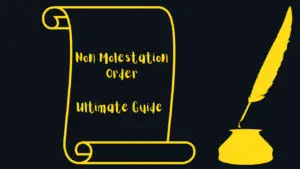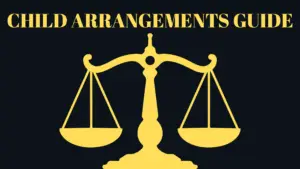Served with a Non-Molestation Order? The Ultimate Father’s Guide to What Happens Next
“Last Updated” Date: Saturday, 18 October 2025
The moment a process server hands you that envelope, or you find it on your doorstep, your world turns upside down. Being served with a Non-Molestation Order (NMO) is shocking. You may feel blindsided, panicked, and angry, especially if the allegations feel false or wildly exaggerated. It’s a moment of intense crisis.
The stakes are incredibly high. A breach is not a civil matter; it’s a criminal offence. This guide is your strategic lifeline. We will cut through the legal jargon and give you a clear, practical plan to navigate this, protect yourself, and fight for your relationship with your children. Trust is built on clarity, and that’s what we’ll provide.
Key Takeaways
- Breach is a Criminal Offence: Breaching an NMO, even by replying to a text, is a criminal act under Section 42A of the Family Law Act 1996, punishable by up to five years in prison.
- No Contact Means NO Contact: This includes replying to the applicant if they contact you first. Any reply from you is a new breach.
- NMO vs. Child Contact: The NMO is separate from child contact. It does not automatically stop you from seeing your children, but you will likely need a separate Child Arrangements Order (C100).
- Undertaking vs. Contesting: You have a critical choice at your first hearing: offer an ‘undertaking’ (a promise to the court without admitting guilt) or contest the allegations.
Want one-to-one guidance on this? Message us now on WhatsApp.
Jump To
- A Deep Dive: What is a Non-Molestation Order and What Does “Molestation” Mean?
- Your Immediate 4-Step Action Plan
- At a Glance: Undertaking vs. Contesting the Order
- Common Mistakes That Lead to a Criminal Record
- Non-Molestation Orders and Child Contact: What You Must Know
- FAQs about Non-Molestation Orders
🧠 Insider Insight: Being served an ‘ex parte’ (without notice) order feels deeply unfair. It’s granted based on only one side of the story. But you MUST comply. Your chance to tell your side comes at the ‘return hearing’. Do not breach the order, or you may prove their case for them. Learn more about Lach’s background.
A Deep Dive: What is a Non-Molestation Order and What Does “Molestation” Mean?
What is a Non-Molestation Order?
A Non-Molestation Order (NMO) is a type of injunction (a special court order) issued by the Family Court. It is granted under Part IV of the Family Law Act 1996.
What This Means For You: It’s a legal document that prohibits you (the respondent) from ‘molesting’ the person who applied (the applicant) or any relevant child. It’s designed to provide urgent protection from behaviour the court deems abusive, harassing, or threatening. Most NMOs are granted ‘ex parte’, or without notice, meaning you get no say before it’s issued. Your first opportunity to respond is at the ‘return hearing’.
What Does “Molestation” Legally Mean?
The Family Law Act 1996 does not provide a single, exact definition. Instead, case law has established that ‘molestation’ covers a wide range of behaviours, not just physical violence.
What This Means For You: This is a critical point. Molestation can include:
- Physical violence or threats.
- Intimidating, harassing, or pestering behaviour.
- Repeated unwanted phone calls, texts, or social media messages.
- Verbal abuse or coercive control.
- Damaging property.
- Waiting outside someone’s home or workplace.
The order will specify exactly what you are banned from doing. You can find more details in our comprehensive NMO guide.
A Real Life Scenario: You are served an ex parte order. It says you must not ‘molest, harass, or pester’ your ex-partner or contact her directly or indirectly. Later that day, she texts you, “You’ve ruined my life.” You text back, “That’s not fair, I just want to see the kids.” You have just committed a criminal offence. The reason for your reply doesn’t matter; the act of replying is the breach.
Your Strategic Path: Your Immediate 4-Step Action Plan
You’ve been served. Do not panic. Take a deep breath and follow these steps precisely.
- Read Every Word: Read the order and the supporting witness statement (the allegations) carefully. Note the ‘return hearing’ date and the exact prohibitions (what you can’t do).
- Comply 100% Immediately: From this second forward, you must follow the order perfectly. This means NO contact. Block their number, block them on social media. This is not an admission of guilt; it is compliance with a court order and protects you from criminal charges.
- Gather Your Evidence: Start building your defence against false allegations. If their claims are untrue, gather hard evidence to prove it. This could be texts, emails, work rotas, bank statements, or CCTV footage that contradicts their statement.
- Prepare for the Return Hearing: This is your first chance to respond in court. You must decide on your strategy: will you contest the order or offer an undertaking? (See our comparison below).
At a Glance: Undertaking vs. Contesting the Order
At the return hearing, you will face this strategic choice. An undertaking is a formal, binding promise to the court, made without admitting to the allegations.
| Feature | Contesting the NMO | Offering an Undertaking |
|---|---|---|
| Goal | ✅ To have the allegations dismissed and the NMO removed entirely. | ✅ To resolve the case without admitting guilt and avoid the criminal risk of an NMO. |
| When to Use It | When you have strong, hard evidence to disprove the allegations and cannot live with the restrictions. | When the allegations are minor or hard to disprove, and you want to minimise risk, cost, and stress. |
| Admission of Guilt | None. You argue the NMO is not necessary. | None. It is made on a “without admissions” basis. |
| Breach Consequence | Criminal Offence. Leads to police arrest, prosecution, and a potential prison sentence. | Contempt of Court. Leads to a hearing back in Family Court (not criminal). Can result in a fine or prison (up to 2 years). |
| Criminal Record | ✅ A conviction for breach will result in a criminal record. | ❌ A breach does not lead to a criminal record. |
| Outcome | If you win, the NMO is discharged. If you lose, a final NMO is made, and negative findings may be recorded against you. | The NMO application is withdrawn, and the undertaking replaces it. The case is closed. |
Avoid costly mistakes — chat with us today and get practical, fixed-fee support.
Common Mistakes That Lead to a Criminal Record
🧠 Insider Insight: The police’s job is to enforce the order, not to listen to your side of the story or debate its fairness. If they have reasonable grounds to suspect a breach, they can arrest you. Do not put yourself in that position. The “reply” text is the most common, and most avoidable, path to a criminal record. Learn more about Lach’s background.
Common Pitfalls:
- Replying to the Applicant: Why this is a mistake: This is the #1 trap. They contact you. You reply. You have breached the order, and they have not. Your reply is a new, separate act of contact and a criminal offence. Do not reply. Ever. See our guide to NMO breaches.
- Indirect Contact (Third-Party Contact): Why this is a mistake: You ask your mum, a friend, or even your child to “just pass on a message” to the applicant. This is an indirect breach and is explicitly forbidden. This also includes posting vague messages about them on social media.
- Ignoring the ‘Ex Parte’ Order: Why this is a mistake: Because you weren’t in court, you might think the temporary (ex parte) order isn’t ‘real’ yet. This is dangerously wrong. It is 100% legally binding and carries a power of arrest from the moment you are served.
Non-Molestation Orders and Child Contact: What You Must Know
This is a source of huge panic for dads, so let’s be crystal clear: a Non-Molestation Order does not, by itself, stop you from seeing your children. The NMO (under the Family Law Act 1996) and a Child Arrangements Order (under the Children Act 1989) are separate legal matters.
However, an NMO will almost certainly be used by your ex-partner to stop contact. They will argue you are a risk. The court’s primary concern is the child’s welfare, and it operates on a ‘presumption of parental involvement’—meaning it wants you to be involved, unless there’s a risk of harm.
What This Means For You: You cannot leave this to chance. If contact has stopped, you must be proactive. You will need to make a separate, urgent application to the court for a Child Arrangements Order (using a C100 form). The court will consider the NMO allegations but will treat the child’s right to a relationship with you as a distinct issue. Be prepared for the court to initially order supervised or indirect contact while it investigates.
FAQs about Non-Molestation Orders
Here are quick answers to the most urgent questions we hear from dads in your position. For more, see our respondent’s guide.
Can I go to jail for breaching a non-molestation order?
Yes. Breaching a Non-Molestation Order is a criminal offence under Section 42A of the Family Law Act 1996. This is not a ‘contempt of court’ matter like an undertaking. If you are arrested and prosecuted, the maximum sentence upon conviction on indictment (in Crown Court) is imprisonment for up to five years, a fine, or both. The Sentencing Council guidelines show how seriously this is taken.
How can I get a non-molestation order removed?
You can apply to ‘discharge’ (cancel) the order using Form FL403. To succeed, you must show a “material change in circumstances” since the order was made. This could include completing relevant courses (like anger management), a long period of perfect compliance, or successful child contact progressing. We have a detailed guide on how to discharge an NMO.
How do I apply for a Non-Molestation Order?
To apply for an NMO, you (or your ex-partner) must use Form FL401 and submit it to the court with a detailed witness statement. There are no court fees for applying for an NMO.
From Crisis to Control: Get Expert Help Today
At Dads Consultancy, we provide the specialised, expert support to move you from crisis to control. We can help you with:
- Responding to Non-Molestation Orders
- Defending False Allegations
- Making Your Application (C100)
- Handling the CAFCASS Call
- Navigating Child Arrangements Orders
- McKenzie Friend Support
- MIAM/Mediation Guidance
- Responding to Non-Molestation Orders
- Drafting Powerful Position Statements
- Navigating Section 7 Reports
Being served an NMO can feel like the ground has been pulled from under you. You don’t have to face this alone. The decisions you make in the next few days will have a lasting impact on your future and your access to your children. We are experts in helping dads navigate false or exaggerated allegations, prepare for court, and fight to maintain their role as a father. Contact us today for a fixed-fee consultation and get a clear strategy.
🧠 Insider Insight: Lach, our founder, is a former Cafcass and Children’s Services Social Worker. He has been on the inside of the family court system, writing the very reports that influence court outcomes. Now he uses that insider knowledge to help dads navigate the process effectively. Learn more about Lach’s background.




